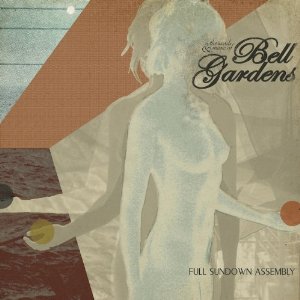The story of Bell Gardens can be distilled into this: two exciting talents doing highly original and abstract things in two disparate fields come together to make an album that revisits heavily trodden ground, is rooted in the past and offers no particular innovation or complexity. For all that, Full Sundown Assembly is at times a beautiful album, and one that is firmly devoted to reaffirming the lovely rather than actual invention.
Bell Gardens, named after the Californian city near where they reside in Los Angeles, are made up of two thoughtful and ambitious musicians. One is Kenneth James Gibson, who as [a]pendics.shuffle is an esteemed exponent of experimental electronica and techno. His partner, Brian McBride is one half of the fascinating Stars Of The Lid, purveyors of drone/minimalism informed by avant-garde classical. For Bell Gardens, all that has been put aside as the pair embrace an overt and confessed devotion to the production of Phil Spector, the psychedelic harmonies of late 60s Beach Boys and the more lilting, lullaby-ish qualities of folk-prog.
The prog element, manifested as a soft, benevolent kind of thing, is generally balanced with some straightforward, formulaic songwriting, which still works due to its sincerity, the conviction of its delivery and some cosy, bucolic arrangements involving flutes and strings. The album is overall a very nice balance between utilising the low and limited vocals of Gibson and some meandering (if extremely precise) instrumental passages. As far as the songs go, there is an attractive combination of The Carpenters and Sufjan Stevens on ‘Differently Tonight’, the neatest and most engaging track on the record. Other touchstones include Patrick Watson (the theme on opener ‘Clinging To The Almost’) and Tamer Animals (the not particularly satisfying ‘Bobby’).
As much as it is hackneyed and utterly tiresome to mention them, Bell Gardens embrace the Beach Boys with extravagant gusto. ‘Nowhere’, for example, achieves a sumptuous sound through its harmonies and the attention-demanding echo on the percussion (sleigh bells, the Brian Wilson staple). However, this and the equally vintage ‘Through The Ruin’ fail to truly ignite due to the relative inadequacy of the song. Both are a little stunted and hugely contrived, and do not demand the instant wonder of the Beach Boys (and perhaps fellow influence Crosby, Stills and Nash) through the unexpected and often impudent weavings of their harmonies. The goodwill and feeling behind the songs, however, cannot be doubted – in fact this quality goes a long way to making an album that on first few listens may drift too much, so listenable.
Full Sundown Assembly‘s biggest problem is its lack of changes of pace and variations in rhythm – the qualities that made Gibson and McBride’s heroes so worthy of providing inspiration. Bell Gardens, however, do succeed brilliantly with ‘Fruitcup’ which allows an alt-country/early Wilco feel to complement the Wilson-isms, providing a pleasant diversion from the relentless swelling and ebbing that makes up the other seven tracks. It is impossible not to find joy in Bell Gardens’ first album, but it does leave some important things untapped.


